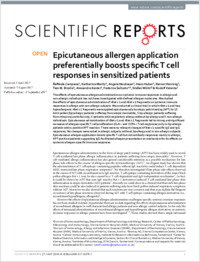Epicutaneous allergen application preferentially boosts specific T cell responses in sensitized patients
- Campana, Raffaela Division of Immunopathology, Department of Pathophysiology and Allergy Research, Center of Pathophysiology, Infectiology and Immunology, Vienna General Hospital (AKH), Medical University of Vienna, Vienna, Austria
- Moritz, Katharina Division of Immunology, Allergy and Infectious Diseases (DIAID), Department of Dermatology, Vienna General Hospital (AKH), Medical University of Vienna, Vienna, Austria
- Neubauer, Angela Biomay AG, Vienna Competence Center, Vienna, Austria
- Huber, Hans Biomay AG, Vienna Competence Center, Vienna, Austria
- Henning, Rainer Biomay AG, Vienna Competence Center, Vienna, Austria
- Brodie, Tess M. Institute for Research in Biomedicine (IRB), Faculty of Biomedical Sciences, Università della Svizzera italiana, Switzerland
- Kaider, Alexandra Center for Medical Statistics, Informatics and Intelligent Systems, Section for Clinical Biometrics, Medical University of Vienna, Vienna, Austria
- Sallusto, Federica Institute for Research in Biomedicine (IRB), Faculty of Biomedical Sciences, Università della Svizzera italiana, Switzerland - Institute of Microbiology, ETH Zuerich, Switzerland
- Wöhrl, Stefan Division of Immunology, Allergy and Infectious Diseases (DIAID), Department of Dermatology, Vienna General Hospital (AKH), Medical University of Vienna, Vienna, Austria
- Valenta, Rudolf Division of Immunopathology, Department of Pathophysiology and Allergy Research, Center of Pathophysiology, Infectiology and Immunology, Vienna General Hospital (AKH), Medical University of Vienna, Vienna, Austria
-
14.09.2017
Published in:
- Scientific reports. - 2017, vol. 7, p. 11657
English
The effects of epicutaneous allergen administration on systemic immune responses in allergic and non-allergic individuals has not been investigated with defined allergen molecules. We studied the effects of epicutaneous administration of rBet v 1 and rBet v 1 fragments on systemic immune responses in allergic and non-allergic subjects. We conducted a clinical trial in which rBet v 1 and two hypoallergenic rBet v 1 fragments were applied epicutaneously by atopy patch testing (APT) to 15 birch pollen (bp) allergic patients suffering from atopic dermatitis, 5 bp-allergic patients suffering from rhinoconjunctivitis only, 5 patients with respiratory allergy without bp allergy and 5 non-allergic individuals. Epicutaneous administration of rBet v 1 and rBet v 1 fragments led to strong and significant increases of allergen-specific T cell proliferation (CLA+ and CCR4+T cell responses) only in bp-allergic patients with a positive APT reaction. There were no relevant changes of Bet v 1-specific IgE and IgG responses. No changes were noted in allergic subjects without bp allergy and in non-allergic subjects. Epicutaneous allergen application boosts specific T cell but not antibody responses mainly in allergic, APT-positive patients suggesting IgE-facilitated allergen presentation as mechanism for its effects on systemic allergen-specific immune responses.
- Language
-
- English
- Classification
- Medicine
- License
- Open access status
- gold
- Identifiers
-
- RERO DOC 327164
- DOI 10.1038/s41598-017-10278-1
- ARK ark:/12658/srd1319148
- Persistent URL
- https://n2t.net/ark:/12658/srd1319148
Statistics
Document views: 175
File downloads:
- Texte intégral: 150
